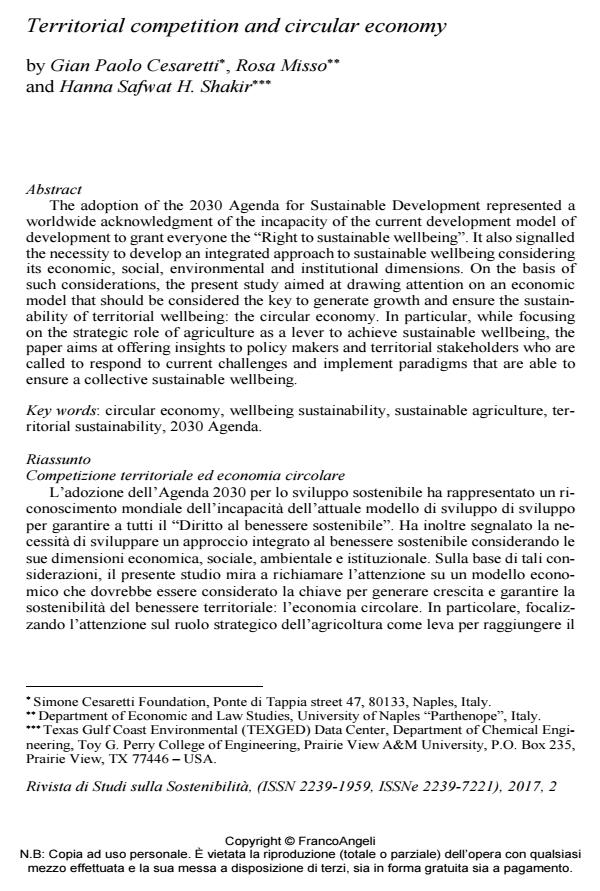Territorial competition and circular economy
Journal title RIVISTA DI STUDI SULLA SOSTENIBILITA'
Author/s Gian Paolo Cesaretti, Rosa Misso, Hanna Safwat H. Shakir
Publishing Year 2017 Issue 2017/2
Language English Pages 12 P. 31-42 File size 177 KB
DOI 10.3280/RISS2017-002003
DOI is like a bar code for intellectual property: to have more infomation
click here
Below, you can see the article first page
If you want to buy this article in PDF format, you can do it, following the instructions to buy download credits

FrancoAngeli is member of Publishers International Linking Association, Inc (PILA), a not-for-profit association which run the CrossRef service enabling links to and from online scholarly content.
The adoption of the 2030 Agenda for Sustainable Development represented a worldwide acknowledgment of the incapacity of the current development model of development to grant everyone the "Right to sustainable wellbeing". It also signalled the necessity to develop an integrated approach to sustainable wellbeing considering its economic, social, environmental and institutional dimensions. On the basis of such considerations, the present study aimed at drawing attention on an economic model that should be considered the key to generate growth and ensure the sustainability of territorial wellbeing: the circular economy. In particular, while focusing on the strategic role of agriculture as a lever to achieve sustainable wellbeing, the paper aims at offering insights to policy makers and territorial stakeholders who are called to respond to current challenges and implement paradigms that are able to ensure a collective sustainable wellbeing.
Keywords: Circular economy, wellbeing sustainability, sustainable agriculture, territorial sustainability, 2030 Agenda.
- Unveiling the impact of territorial and network embeddedness on circular economy adoption in cooperatives Chiara De Bernardi, Filippo Corsini, Nora Annesi, Marco Frey, in Business Ethics, the Environment & Responsibility /2025 pp.1300
DOI: 10.1111/beer.12711 - Circularities in territories: opportunities & challenges Sebastien Bourdin, Danielle Galliano, Amélie Gonçalves, in European Planning Studies /2022 pp.1183
DOI: 10.1080/09654313.2021.1973174
Gian Paolo Cesaretti, Rosa Misso, Hanna Safwat H. Shakir, Territorial competition and circular economy in "RIVISTA DI STUDI SULLA SOSTENIBILITA'" 2/2017, pp 31-42, DOI: 10.3280/RISS2017-002003